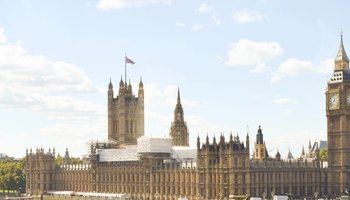
In most contexts, ping-pong involves paddles, a small white ball, and perhaps some friendly competition over Sunday afternoon drinks. In Parliament, however, ping-pong can become a matter of constitutional significance - particularly when it concerns the future of Britain's £126 billion creative industries and the rights of 2.4 million creative workers.
The Data (Use and Access) Bill is still undergoing what may be the most extraordinary round of parliamentary ping-pong in recent memory, with the House of Lords voting 221 to 116 to send the legislation back to the Commons for the fourth time. At stake: whether AI companies should be required to disclose when they use copyrighted material to train their systems.
What began as routine legislative scrutiny has evolved into a fundamental disagreement about property rights, international influence on domestic policy, and the balance between innovation and protection for creative industries. The ball is now firmly in the government's court - and their next move will determine whether months of careful legislative work results in meaningful reform or spectacular political failure.
The legislation that almost wasn't about AI
This Bill started life with far more modest ambitions. Originally conceived to establish frameworks for data sharing whilst maintaining appropriate safeguards, it included important provisions for Smart Data schemes (building on the success of Open Banking), digital verification services, and enhanced access to data for bereaved families and coroners.
The government successfully secured several technical amendments that will genuinely improve how data works in Britain:
Smart Data evolution: A series of amendments removed expenditure constraints on fees, providing greater flexibility for Open Banking and future Smart Data schemes across energy, telecommunications, and transport. These changes recognise that commercial viability is essential for schemes that now serve over 10 million people.
Digital verification clarity: The Lords agreed to provisions clarifying how digital verification services will handle sensitive data, including confirmation that systems verifying gender identity cannot be used where biological sex verification is required.
Enhanced research capabilities: New provisions support scientific research whilst maintaining appropriate ethical frameworks - though these too became contentious during the AI copyright debates.
The government also committed to producing an economic impact assessment and comprehensive report on AI and copyright within nine months - down from an original 12-month timeline following Lords’ pressure.
When ping-pong becomes a constitutional crisis
What transformed routine legislative passage into constitutional drama was the persistence of cross-bench peer Baroness Kidron, whose amendments demanding AI transparency have now been rejected by the Commons three times and supported by the Lords twice.
Her core argument is elegantly simple: if you cannot see what copyrighted material is being used to train AI systems, you cannot enforce existing copyright law. "What you cannot see, you cannot enforce," became her rallying cry throughout months of parliamentary exchanges.
The latest Lords amendment would require the government to introduce regulations mandating that AI companies provide "clear, relevant, accurate and accessible information" about their use of copyright works within six months of publishing their promised report on AI and copyright.
What made this round of ping-pong particularly striking was the breadth of support. Lord Cashman, speaking as "an unaffiliated Member" despite sitting on Labour benches, declared: "I believe, like everybody else here, we are here to pursue the principles we believe in." Conservative peer Lord Dobbs noted the government's declining support through successive votes: from 125 supporters in the first round to just 116 in the most recent division.
Even some government supporters acknowledged the problem. Lord Knight of Weymouth admitted the issue had been "appallingly dealt with by the Government" whilst ultimately supporting them on constitutional grounds.
International pressures and uncomfortable truths
Perhaps the most uncomfortable moment in recent debates came when Lord Russell of Liverpool quoted US Vice-President Vance's warning that "America cannot and will not accept" foreign governments "tightening the screws on U.S. tech companies." He also cited OpenAI's call for the UK to avoid "policy uncertainty" and Google's assertion that "training on the open web must be free."
Lord Pannick directly challenged the government: "Will she tell the House, in the interests of transparency, what weight the Government have given to the concerns of the United States Government in resisting the repeated amendments?"
Minister Jones of Whitchurch firmly denied any "side deals" with the US, but the questions illuminated the uncomfortable reality of British tech policy in 2025: balancing domestic interests against pressure from Silicon Valley giants and their government allies.
The constitutional dimension
Beyond policy substance lies a genuinely interesting constitutional question. Since 1997, 14 Bills starting in the Lords have required three or more rounds of ping-pong, with two achieving five rounds. This level of disagreement, whilst unusual, has clear precedent.
The government repeatedly warned that continued Lords insistence could "collapse" the Bill entirely, threatening beneficial measures including enhanced data access for bereaved families and new offences for deepfake intimate image abuse. However, peers correctly noted that any decision to abandon the legislation would rest entirely with the government.
Baroness Kidron made this explicit in her closing remarks: "If we vote on this amendment, one of three things will happen: the Commons can consider the amendment and accept it; the Commons can put an amendment in lieu, or... the Commons can collapse the Bill. That is the situation."
Where digital identity meets practical reality
Amid the constitutional drama, practical implementation continues. The Government Digital Service announced engagement with private sector providers on the proposed GOV.UK Wallet, with plans to launch the first digital credential - a veterans card - this summer, followed by digital driving licences later in 2025.
This implementation timeline illustrates the careful balance the legislation seeks to achieve between government standards and private sector innovation. The framework being established will create space for both government-issued credentials and private sector identity verification services to coexist and compete.
The EU adequacy elephant in the room
Running parallel to these domestic debates is the critical question of UK-EU data adequacy. The current adequacy decision expires on 27 June 2025, with the European Commission having proposed a six-month extension through December 2025.
This timing is not coincidental. The Commission explicitly wants to assess the UK's reformed data protection framework once this Bill becomes law. Meanwhile, Prime Minister Starmer's "Brexit reset" deal includes extensive provisions for data sharing between UK and EU law enforcement agencies—cooperation that would be practically impossible without continued adequacy status.
The combination of pending adequacy review and extensive new data cooperation arrangements suggests the government has calculated that its reforms maintain sufficient alignment with EU standards to preserve this vital status.
Next steps: compromise or collapse?
The Bill now returns to the Commons facing a moment of truth. The government has three options:
Accept the Lords amendment: This would require introducing transparency regulations within six months of their own report, creating a defined pathway for creative industry protection whilst maintaining their broader consultation approach.
Propose an amendment in lieu: A compromise that addresses core concerns about timelines whilst preserving government flexibility - perhaps offering a backstop power to introduce transparency measures if voluntary approaches fail.
Reject the amendment entirely: This risks the Bill's collapse entirely, depriving the country of numerous beneficial measures and creating an unprecedented political and legislative failure.
Constitutional precedent suggests the third option would be extraordinary. Previous ping-pong episodes - including the Health and Social Care Bill in 2001 - have typically concluded with governments finding face-saving compromises rather than abandoning entire legislative programmes.
Implications for data policy and beyond
For organisations working with data, this legislative journey illustrates the complex interplay between domestic policy-making and international pressures in the digital age. The Smart Data provisions will create genuine opportunities for innovation in financial services and beyond, whilst the digital verification framework establishes important standards for identity verification.
However, the AI copyright dispute reveals deeper tensions about how Britain positions itself in global technology markets. The creative industries' campaign has demonstrated that domestic constituencies can successfully challenge government policy - even when that policy appears aligned with powerful international interests.
Whether the government finds a compromise or allows the Bill to collapse will send important signals about Britain's willingness to protect domestic industries against Silicon Valley pressure.
The next few days will determine whether parliamentary ping-pong concludes with a satisfying rally or an unexpected smash into the net. Either way, the game has already revealed much about power, influence, and democratic accountability in Britain's digital future.


